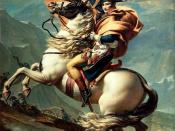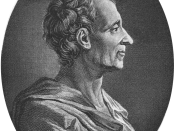The age of Enlightenment took place between the time when Louis XIV died (1715), and the coup d'etat (1799, when Napoleon came into power. It is during this time period that the French Revolution occurred, as well as several other stages of reform. Strongly influenced by the pertinent reformations, the people began to exit the times of darkness, and entered a time of growth. The ideas of growth, reason, and natural law built a strong foundation for the enlightenment (Paul Hallsal). Incredible faith in human reason as well as the advancement of secularism was an important goal of European countries during this time period. During the age of Enlightenment, progression in many fields such as business, government, and literature, as well as the ability to set goals and achieve them, was of tremendous importance. Natural Law was incorporated into the daily social lives of all people, as it specifically describes the existence and order of natural life.
Additionally, a goal that most of the countries shared was to have a reformed government, rule, and distinct role of the people, based on the well-being of each individual country. Although many "Enlightened Thinkers", or philosophes, such as Hume, Locke, Voltaire, Rousseau, and Montesquieu had contradicting attitudes toward human nature and politics, they all played a key role in the development of the ideas, which set a foundation for many modern countries to evolve from. England and France, for example, were both strongly influenced by the ideas and reforms brought upon by several crucial historical figures of the time, as their governments and other ideas were formed based upon certain principles from the individuals. "There is no crueler tyranny then that which is perpetuated under the shield of law and in the name of justice", said Baron de Montesquieu (Charles Secondat). In this statement, Montesquieu expresses how strongly he opposes to the qualities of the current law, and he also emphasizes that there are many crimes that can be committed if the law system is unjust. Montesquieu, one of the greatest philosophes, opposes absolutism and desires the return of the powers from the government to the people and therefore influenced many people concerning the system of government. Many other new cultural enhancements evolved as a result of the enlightenment, such as salons, clubs, cafÃÂés, and the expansion of reading by the general public. More specifically, in France, the French Revolution was based on the new enlightenment ideas from philosophes like Montesquieu. Henri Peyre asserts that an important role in the revolution was played by the ideas of the great Enlightenment thinkers, which in many ways were responsible for the long lasting success of the basic French culture.
The French Revolution was sparked by events that preceded its beginning. As publicly stated by writer Ernest Labrousse, the French Revolution was caused by a serious financial crisis in France (Class Notes). The wars that occurred prior to the revolution were extremely costly, and quickly led the country into a financial deficit. The king responded to these debts with tax raises. Because of this tax increase the nobles launched a period of revolution. The revolutionaries had many clear goals, and without a doubt, had a strong emphasis on liberty, equality, and fraternity. They aimed to achieve political, social, and economic change, as well. R.R. Palmer asserted that the French Revolution was an important aspect of a much broader Age of Democratic Revolution, which is exactly what transpired. It clearly marked triumph of the forces of reason and order over previous beliefs of superstition and privileges of specific social classes. One major problem of the time was the existing tensions between social classes due to extreme distinctions among people, so a radical social change was definitely anticipated ("Social Causesâ æ"). Therefore the abolition of feudalism was a enormous step towards equality, because people were now beginning to put an end to the class distinctions that existed so bitterly, in which George Lefevavre and Simon Schama had expected due to the overly power aristocratic upper class (Class Notes). The blending of the three estates allowed people to work together more efficiently, and trust each other's opinions about politics, economics, and etc. From the public perspective, it appeared that the people were finally striving for equality of opportunity under the law. People also felt that, in order to achieve liberty, they must liberate themselves of all unfair rules, which separated social classes. Even peasants thought that they must liberate themselves of all unfair rules, which separated social classes. Even peasants thought that they needed to be liberated, and therefore rebelled against their feudal lords. Besides the social shifts occurring, people felt that an economic shift was also necessary. Trade played a very important role in the revolution, because it allowed for the influence of a capitalist economy, which became the most accepted economic form in Europe (Richard Orsinger). Next, was the way in which the current government voted. Pamphlets had been distributed, for example, which called for the representatives to vote as a whole, instead of as the three divided bodies. This worked very well, but caused fear among the noble class that they might lose their power, and therefore caused minor political tensions by June 1789. After the revolution, France was much closer to having social and political unification and order. "French politics was a battle waged among political theorists", and its destiny still remained in the hands of its new heir, Napoleon Bonaparte (Richard Orsinger)
Napoleon used his power to "put an end to the civil strife"(Class Notes) in France. Early in Napoleon's rule, he created the Civil Code. Though this, he affirmed two of the principles of the "Declaration of the Rights of Man and the Citizen," equality among men and the security of wealth and private property. However, as time wore on, one notices that he did not abide by any agreement relating to freedom of speech and his police forces became as vicious and ruthless as ever. This obviously goes against any of the ideals in the "Declaration of the Rights of Man and the Citizen." By the year 1811, only four newspapers existed in France, each just a branch of government created propaganda (McKay 714). As for the police, they arbitrarily detained suspected criminals. There were about 2, 500 people in state prison in 1814 (Class Notes). Obviously, Napoleon did not follow the political ideas of such enlightenment thinkers as Locke and Rousseau, but rather those of Nicolo Machiavelli. One must do whatever it takes to rule a country and keep it in a peaceful state.
Napoleon's actions show that he did not take must notice to the thoughts of the bourgeoisie and the goals of the French Revolution. He ruled the country as he saw fit in order to keep it in a peaceful state. His choice to abolish freedom of speech and impose a harsh, strict secret police on the citizen shows that he was against the ideals of the French revolution.


![Image taken from page 403 of '[The History of the French Revolution. Translated by F. Shoberl.]'](https://s.writework.com/uploads/1/11185/image-taken-page-403-history-french-revolution-translated-f-thumb.jpg)